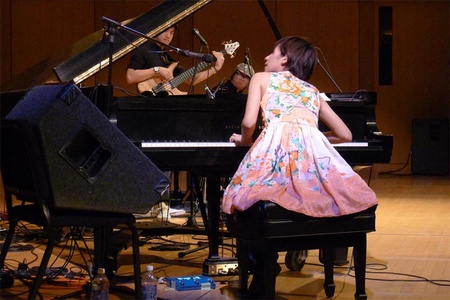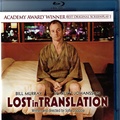We recently were privileged to enjoy a concert of contemporary jazz by a vibrant young group from Japan, the Ai Kuwabara Trio Project. Simply put, the combo rocked the joint at the King Center for the Performing Arts at the Auraria campus. The auditorium was full for the free performance, and I bet everyone there were blown away.
Pianist Kuwabara is impossibly young for such an astonishingly assured and accomplished musician and composer. She’s a mere 23 years old, but she and her bassist and musical partner Yusuke Morita have already released two albums as the Ai Kuwabara Trio Project (the “Project” part is because the group doesn’t have a permanent drummer, though Shintaro Imamura is doing a sterling job on the current tour).
The musicians’ youth comes through in the way they are almost starstruck at their own success. At a pre-show reception, Kuwabara bowed deeply when she was introduced to Ikuhiko Ono, the Consul General of Japan at Denver, and his wife Eiko. The tour is organized by the Japan Foundation of Los Angeles, which brings a variety of Japanese arts and culture and showcases them here in the States. This particular tour was too brief: The group played in Berkeley and LA before coming to Denver, and the next day they flew off to Anchorage—yes, Alaska—to perform one more time before flying back to Japan.
But perhaps the tour wasn’t too short to prevent some homesickness. After a week of American food, the musicians snarfed up Cup Noodles ramen for dinner because they missed Japanese cuisine. It’s a pity they didn’t have the time to explore Denver’s many fine Japanese restaurants….
The musicians spent the day at Metro State University where the concert was held, giving workshops and speaking to music students. Many of them were in attendance at the concert, which was free of charge thanks to the Japan Foundation.
Musically, the group lives up to Kuwabara’s admission that she doesn’t necessarily think of herself as a jazz player. “If you go to a CD shop, of course you will find our albums in the jazz corner,” she says in the concert’s program. “However, I must admit that I have never thought of myself as a jazz pianist.”
Kuwabara plays jazz, of course, but her compositions, and the support she gets from the other musicians, isn’t like cool urban jazz all steeped in R&B, or swing with mainstream rhythms (except for one number during the concert). Instead, the band plays dense modern strains of jazz with the energy of rock and rollers, and even progressive rock, with sudden stops and starts like bands such as Yes in their heyday.
For this night, the trio rips through a set that draws from the pantheon of contemporary jazz—opening with “Havona,” a song by the pioneering late bassist Jaco Pastorius, who set new standards for the instrument with his supple, elastic sound, which Morita echoes. Many of the songs start with Kuwabara playing contemplative melodies that rev up when Morita and Imamura join in.
At times the three play thrilling crescendos of cacophonous sound, the slithering bass keeping things together while the drums reflect everything from bebop timekeepers like Kenny Clarke to musical anarchists like the Who’s Keith Moon. And Kuwabara weaves her keys in and out of the sonic mix, sometimes picking out pretty trilling notes and other times pounding out chords almost like she’s attacking the Steinway.
With her pretty frilly Japanese print dress and her Doc Marten-style combat boots, her music makes sense of her visual presentation. At times she’s like an acolyte of Keith Jarrett, the uber-melodic (though occasionally meandering) solo pianist and other times you can hear how much she’s been influenced by the likes of jazz-rock fusionistas like Chick Corea and his classic ’70s band, Return to Forever.
Then, towards the close of the evening, she started plunking away with a bluesy rhythm that got the older “mainstream” jazz fans excited. She swung into one of her heroes, Michel Petrucciani’s pretty “Cantabile.” She had fun throughout the night, but she seemed to especially love playing this song; at one point, she was all grins as she lay her left arm on the piano while she picked out notes for a stretch only with her right hand.
For a tiny woman, her physicality is awesome. Erin had to compare hands with her after the show, and Kuwabara has tiny hands, which is amazing for the speed and strength with which she covers the ivories. She also stood often to get better leverage, or just because she was super excited by a passage. Other times her combat boots dangled a few inches off the stage, her feet crossed beneath her. All the while, the other two musicians kept their rapt attention on Kuwabara, taking their cues from her.
The music was fun to watch as well as to listen to.
Her youthful enthusiasm came out again at the end of the concert, when Kuwabara was so taken by the standing ovation that she jumped excitedly, bowed deeply at the waist and then got down on her knees and bowed in utter gratitude to the audience, most of whom couldn’t see what she was doing. Afterwards, all three musicians joined lingering fans in the hallway outside the auditorium and Kuwabara’s sparkling youthfulness shone again, laughing with new fans, leaping to hug an old friend, and posing with fans with the ubiquitous Japanese photo-bomb symbol, the peace sign.
The group had sold out the CDs they brought with them for the tour, so I waited until I got home, and bought her albums, “from here to there” (released in Nov. 2012) and “The Sixth Sense” (this past April) off iTunes. They’re terrific, and well worth checking out.
Her music is stately, solid and inspiring; her personality is a little silly and very lovable and her talent is unquestionable. I hope she comes back to the U.S. in the future, or I get to see her perform in Japan sometime.
Here’s a video I’ve edited together, with excerpts of their Denver performance >>
*This article was originally published on Gil Asakawa’s blog, Nikkei View, on November 28, 2013.
© 2013 Gil Asakawa







